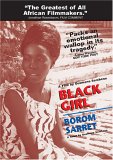| Reviews & Columns |
|
Reviews DVD TV on DVD Blu-ray 4K UHD International DVDs In Theaters Reviews by Studio Video Games Features Collector Series DVDs Easter Egg Database Interviews DVD Talk Radio Feature Articles Columns Anime Talk DVD Savant Horror DVDs The M.O.D. Squad Art House HD Talk Silent DVD
|
DVD Talk Forum |
|
|
| Resources |
|
DVD Price Search Customer Service #'s RCE Info Links |
|
Columns
|
|
|
Black Girl
The film isn't subtle in its storytelling style, but it makes up for its bluntness with a remarkable visual language. The specifics of Diouana's story are often telegraphed by her depressed voiceover, but they are accompanied by beautifully simple images, like her limp form laying in bed or her bare feet under her employers' kitchen table. Diouana's sense of being trapped in a foreign land with no friends, family or freedom is communicated as well through Diop's physical performance and Sembene's imagery as it is through the verbal exposition.
Flashbacks also serve to open the film up visually and to show Diouana's more playful side. Back in Dakar Diouana is driven to find work, going door to door through white apartment buildings looking for a job. And when she meets a man she's saucy and flirtatious. She's even excited at the prospect of moving to France with her employees.
Diop doesn't give the performance of a polished pro (Black Girl is her only credit, according to IMDb) but there is a rich emotional quality to her carefully measured performance. Her profile is especially striking, as is the proud figure she cuts in her boldly patterned dress and stiletto heels. When her mistress demands she remove those shoes in order to clean the house barefoot the visual is powerful.
Black Girl jumps back and forth between the Dakar scenes and the French apartment in a way that predates much more modern films. This style serves to further underscore the tragedy of Diouana's life and how stunned she is that her employers could treat her so poorly. While the film isn't overly preachy in terms of generalizing her struggle, there is no question that Diouana stands in for all the colonized people of Africa who struggled under the patronizing rule of European foreigners. Sembene's film, for its simplicity, is sophisticated in its ability to turn the personal political and the political personal.
VIDEO:
The full-frame video is very soft by modern standards. The images have little in the way of clarity and focus. Wide shots especially lose clarity the most while many of the film's close-up (particularly of Diop) still manage to look pretty good. But I suspect that the source material has degraded hopelessly over time. The transfer itself seems to have been done fairly well. But the source at times is twitchy and flawed.
AUDIO:
The mono sound is similarly rough. Voices are somewhat clear, although they often sound tinny. The soundtrack is French with optional English subtitles.
EXTRAS:
The only extra is a 20 minute short by Sembene called Borom Sarret. The story of a cart driver in Dakar, the short preceded Black Girl by a year and shows the director working on his storytelling and cinematography. Although more contextual extras should have been included, Borom Sarret is invaluable.
FINAL THOUGHTS:
Black Girl may seem obvious to viewers jaded by decades of films made since, but the intimacy and clarity of vision on display here is very impressive. Sembene cuts right to the heart of sadness inside his leading character and his sophisticated yet simple visuals help make the story profound.
|
| Popular Reviews |
| Sponsored Links |
|
|
| Sponsored Links |
|
|
| Release List | Reviews | Shop | Newsletter | Forum | DVD Giveaways | Blu-Ray | Advertise |
|
Copyright 2024 DVDTalk.com All Rights Reserved. Legal Info, Privacy Policy, Terms of Use,
Manage Preferences,
Your Privacy Choices | |||||||













